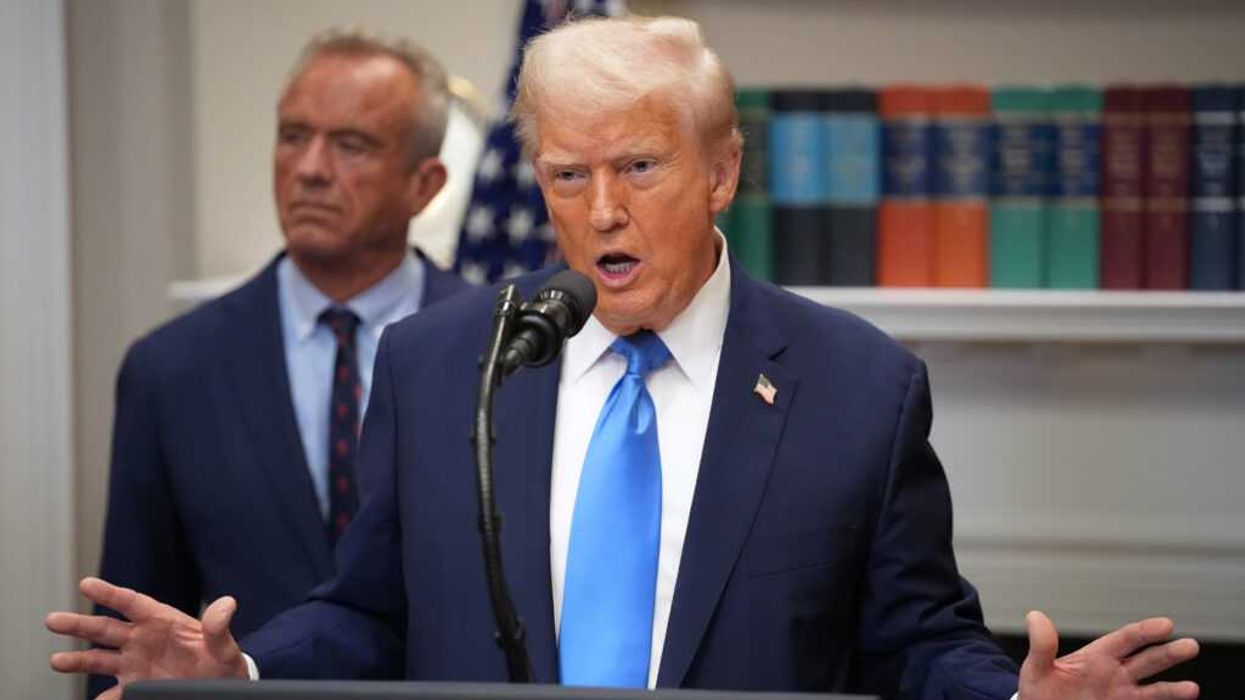President Trump stood at the White House podium, addressing a room full of reporters.
“First, effective immediately, the FDA will be notifying physicians that the use of…ah-said-a…well…let’s see how we say that.”
As he struggled again to say “acetaminophen,” and asked someone off camera, “Is that OK?” when he finally managed to get his lips around the word, the moment was a perfect encapsulation of the dumbing down of expertise and the political corruption of science under this administration.
He said that taking acetaminophen, or Tylenol, while pregnant has been associated with a “very increased risk of autism,” a claim pushed by Health and Human Services Secretary Robert F. Kennedy with little to no basis in scientific fact.
“Taking Tylenol is not good,” Trump declared, as if anyone in their right mind would take medical advice from a guy who suggested injecting disinfectant to treat coronavirus.
Scientists — people who, unlike Trump and Kennedy, have actual expertise in these matters — objected. Dr. Helen Tager-Flusberg, director of the Center for Autism Research Excellence at Boston University called the announcement “appalling” and “a very significant distortion” of what science says about any possible links.
The Coalition of Autism Scientists said: “The data cited do not support the claim that Tylenol causes autism and leucovorin is a cure, and only stoke fear and falsely suggest hope when there is no simple answer.”
And Sura Alwan, a clinical teratologist at the University of British Columbia, said, “The evidence does not support a causal link between acetaminophen or vaccines and autism.”
The absurdity of Trump and Kennedy doling out medical advice, when the former promoted taking anti-malaria medication hydroxychloroquine to ward off COVID-19 — and then contracted COVID-19 himself — and the latter believes chemicals in drinking water can make someone gay or trans, should not be lost on anyone.
Everyone should ignore these crackpot Looney Tunes and trust their doctors and pediatricians, not two politicians cosplaying at science, whose long and sordid history of bad advice could lead to serious injury or death.
And while MAGA-world usually falls in line quickly to defend even Trump’s worst impulses — see Jan. 6, see Russia, see tariffs — this time Tweedledum and Tweedledee aren’t getting quite the support they’re used to. That’s how bad this is.
Less than a day after Trump made his announcement, his own administrator of the Centers for Medicare and Medicaid Services, Dr. Mehmet Oz, went on MAGA favorite Fox News to walk it back.
“So the message is not, ‘Never take Tylenol,’ ” he said, contradicting Trump’s own words. “It’s, ‘Take Tylenol judiciously.’ Take it by talking with your doctor.”
Also on Fox, the network’s own senior medical analyst Dr. Marc Siegel asked and answered the question pretty definitively. “Does acetaminophen during pregnancy cause autism? People out there need to know there’s absolutely no proof whatsoever that that’s the case.”
In Congress, there’s been some rare pushback, too. Senate Majority Leader John Thune told CNN he was “very concerned” and insisted, “science ought to guide these discussions.”
Sen. Bill Cassidy, a licensed physician, posted on X, “HHS should release the new data that it has to support this claim. The preponderance of evidence shows that this is not the case.”
And Rupert Murdoch’s Wall Street Journal blasted Trump and Kennedy’s anti-Tylenol campaign, pointing to lawsuits against the maker of Tylenol and what may be personal interests in those outcomes.
“What’s going on here has less to do with healthcare than with a campaign by the plaintiffs bar,” wrote the Journal’s editorial board. “If a drug company made the unproven claims aired at the White House, the Food and Drug Administration would threaten legal action.”
“So why the sudden alarm, complete with a presidential presser?” it continued. “The Occam’s razor answer is the influence of RFK Jr., who is carrying water for his friends in the plaintiffs bar. A who’s-who of lawsuit shops are pushing the Tylenol-autism link in federal court. The transparent goal is to drum up more claims to drive a bigger damage award or settlement.”
I’m not even sure Trump believes all of the garbage he spewed on Monday. In his inimitable way, he seemed to distance himself from what he was selling, saying, “This is based on what I feel,” and “You know, I’m making these statements from me, I’m not making them from these doctors,” and “I’m not a doctor, but I’m giving my opinion.”
So when asked if it was appropriate for him to tell the public what to do, given it was based on his “feelings,” he answered it was “absolutely appropriate.”
Chef’s kiss.
S.E. Cupp is the host of "S.E. Cupp Unfiltered" on CNN.




















Trump & Hegseth gave Mark Kelly a huge 2028 gift